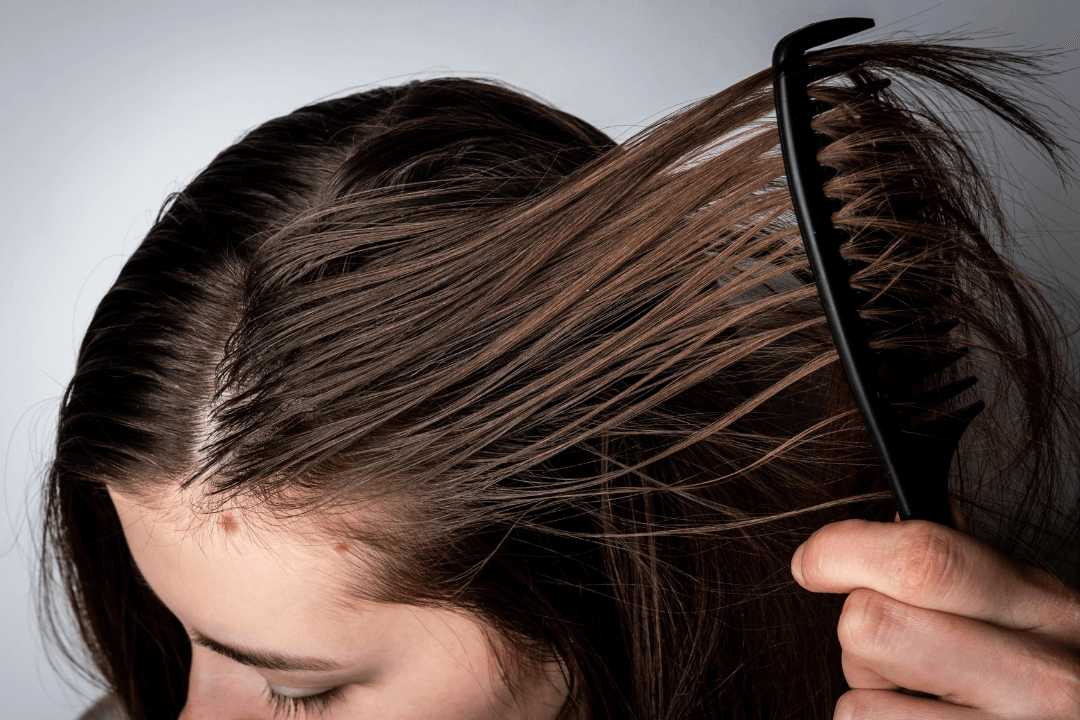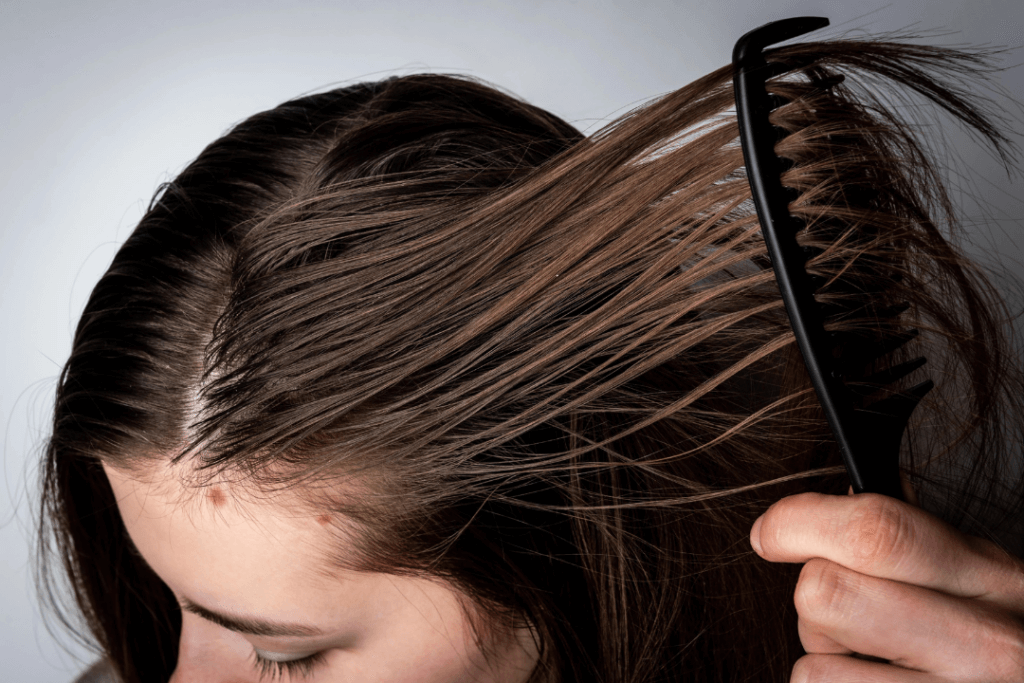If you are dealing with oily hair, you’re not alone. Oily hair can be frustrating to manage and can make you feel self-conscious. Fortunately, there are several simple and effective ways to fix oily hair and keep your locks looking fresh and clean. In this guide, you’ll find a variety of greasy hair hacks that will help you control excess oil. Whether you’re dealing with occasional oily hair or a persistent issue, these greasy hair hacks will help you achieve the beautiful, healthy-looking hair you’ve been dreaming of.
What are the causes of Greasy Hair
Greasy hair, also known as oily hair, is caused by the overproduction of sebum, a natural oil produced by the sebaceous glands on your scalp. Sebum is essential for maintaining healthy hair and skin as it helps moisturize and protect them. However, when the sebaceous glands produce too much sebum, it can lead to greasy hair.
Why Does My Hair Get So Greasy So Quickly?
Sebum is essential for maintaining healthy hair and skin as it helps moisturize and protect them. However, when the sebaceous glands produce too much sebum, it can lead to greasy hair. Several factors can contribute to this overproduction of sebum:
Hormones: Hormonal fluctuations, such as those that occur during puberty, menstruation, pregnancy, and menopause, can affect sebum production. Hormonal imbalances can lead to an increase in oil production, resulting in greasier hair. Follow the source for a comprehensive understanding of Hormonal Fluctuations.
Genetics: Your genetics play a role in how much sebum your scalp produces. If your family members have oily hair, you may be genetically predisposed to it as well.
Diet: Consuming a diet high in greasy or fried foods may increase the oiliness of your hair. While there is no direct link between diet and greasy hair, a healthy diet can contribute to overall skin and hair health. “Your diet is a bank account. Good food choices are good investments.”– Bethenny Frankel
Stress: Stress can trigger hormonal changes that may lead to increased sebum production. Managing stress through relaxation techniques and exercise can help mitigate its effects on your hair.
Shampooing Habits: Paradoxically, washing your hair too frequently or using harsh shampoos can strip away too much of the natural oils, causing your scalp to compensate by producing even more oil. It’s a good idea to find a balance in your hair-washing routine.
Climate: Hot and humid weather can stimulate the sebaceous glands, leading to greasier hair. Dry climates, on the other hand, may result in less oily hair.
Hair Products: Some hair products, such as certain shampoos, conditioners, and styling products, can contain ingredients that make your hair greasier. Look for products labeled as “oil-free” or “for oily hair” if you have this issue.
Hair Brushing: Frequent brushing or touching your hair with dirty hands can distribute the oil from your scalp to the rest of your hair, making it appear greasier.
Medical Conditions: In some cases, underlying medical conditions like seborrheic dermatitis or hormonal disorders can lead to excessive oil production and greasy hair. If you suspect a medical issue, it’s advisable to consult a healthcare professional.
How To Get Rid Of Greasy Hair?
Getting rid of greasy hair involves adopting a proper hair care routine and making lifestyle changes that help control excessive oil production. Here are some steps and tips to help you manage and reduce greasy hair:
Choose the Right Shampoo and Conditioner:
– Use a clarifying or sulfate-free shampoo designed for oily hair. These shampoos help remove excess oil and product buildup without stripping your hair of essential moisture.
– Avoid heavy, moisturizing conditioners, especially on your scalp. Apply conditioner primarily to the ends of your hair to prevent excess oil at the roots.
Adjust Your Washing Frequency:
– Don’t over-wash your hair, as this can stimulate your scalp to produce more oil. Try washing every 2-3 days or as needed based on your hair’s condition.
– On non-wash days, use a dry shampoo to absorb excess oil and freshen up your hair.
Rinse Thoroughly:
– Ensure you rinse your hair thoroughly after shampooing to remove all product residue. Leftover shampoo or conditioner can make your hair appear greasy.
Use Lukewarm Water:
– Avoid hot water, as it can stimulate the sebaceous glands, leading to increased oil production. Opt for lukewarm water when washing your hair.
Avoid Heat Styling:
Excessive heat from styling tools like straighteners and curling irons can stimulate oil production. If you must use heat styling, use a heat protectant and keep the temperature moderate.
Choose Hairstyles Wisely:
– Avoid hairstyles that flatten your hair against your scalp, as this can make it appear greasier.
– Experiment with different styles, such as updos or braids, to add volume and reduce the appearance of greasiness.
Diet and Hydration:
– Maintain a balanced diet rich in fruits, vegetables, and lean proteins, as nutrition can affect the condition of your hair.
– Stay hydrated by drinking plenty of water, as dehydration can sometimes lead to oilier skin and hair.
Reduce Stress:
– Manage stress through relaxation techniques like meditation, yoga, or deep breathing exercises, as stress can affect hormonal balance and increase oil production.
Use Oil-Absorbing Products:
– Look for oil-absorbing products like blotting sheets or powders specifically designed for hair. These can help reduce oiliness throughout the day.
Avoid Touching Your Hair:
– Touching your hair with your hands can transfer oils and dirt to your scalp and hair. Try to minimize touching your hair, especially with dirty hands.
Consult a Professional:
– If your greasy hair persists despite trying various home remedies and hair care products, consult a dermatologist or a hair care professional. They can provide personalized advice and recommend suitable treatments.
Remember that everyone’s hair is different, so it may take some trial and error to find the right routine and products that work best for you. Be patient and consistent in your efforts to manage greasy hair effectively.
Here are some additional greasy hair hacks:
- Use apple cider vinegar. Apple cider vinegar can help to balance the pH of your scalp and reduce oil production. Mix equal parts apple cider vinegar and water and apply it to your hair after shampooing. Let it sit for a few minutes before rinsing it out.
- Use baby powder. Baby powder can help to absorb excess oil from your hair. Apply a small amount of baby powder to your roots and massage it in. Let it sit for a few minutes before brushing it out.
- Use corn starch. Corn starch can also be used to absorb excess oil from your hair. Apply a small amount of cornstarch to your roots and massage it in. Let it sit for a few minutes before brushing it out.
- Use blotting papers. Blotting papers are a great way to remove excess oil from your hair on the go. Simply press a blotting paper to your roots and hold it there for a few seconds. Repeat until all of the excess oil has been absorbed.
Conclusion
Greasy hair can be a common and sometimes frustrating issue, but with the right approach and a bit of patience, it can be effectively managed. Understanding the underlying causes, such as hormonal fluctuations, genetics, and lifestyle factors, is the first step in addressing the problem. By adopting a proper hair care routine, choosing the right products, and making lifestyle adjustments, you can reduce excess oil production and maintain hair that looks and feels fresh.
Thanks for reading Adhunu Blogs
You may like
FAQ
A1: Greasy hair is primarily caused by the overproduction of sebum, a natural oil produced by the sebaceous glands in the scalp. This excess oil can make hair look and feel oily.
A2: The frequency of washing greasy hair can vary from person to person. In general, it’s recommended to wash it every 2-3 days to avoid overstimulating the sebaceous glands. However, some may need to wash more or less frequently depending on their hair type and lifestyle.
A3: Yes, certain hairstyles like updos, braids, and ponytails can help disguise greasy hair by keeping it away from the scalp and reducing its visibility. Experiment with different styles to find what works best for you.
A4: Yes, there are several natural remedies that may help control greasy hair, such as using apple cider vinegar as a rinse, applying cornstarch or baby powder to absorb oil, and using aloe vera gel as a scalp treatment. However, results may vary from person to person.
A5: While there’s no direct link between diet and greasy hair, maintaining a balanced diet rich in fruits, vegetables, and lean proteins can contribute to overall hair health. Drinking plenty of water is also important, as dehydration can sometimes lead to oilier skin and hair.






